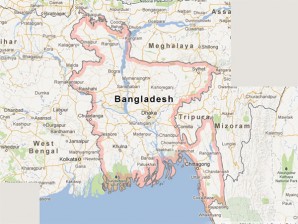
With calls to end punishing belt-tightening measures in the eurozone mounting, Greece’s two main unions called a general strike that caused disruption to transport services including ferries to the islands.
Rallies were called in more than 80 cities in Spain, where unemployment last week surged past 27 percent, to urge a radical change in EU economic policy, while unions in Italy were putting on a concert in the centre of Rome.
In Turkey, anti-riot police fired tear gas and water cannon at stone-throwing crowds angry at a ban on demonstrations in Taksim square, a traditional rallying point in Istanbul.
“Death to fascism. Long live May 1,” protesters shouted.
Fury in Bangladesh focused on the country’s worst ever industrial disaster, the collapse of a garment factory last week that killed more than 400 workers, with furious protesters demanding the execution of the factory bosses.
Despite calls by the prime minister for “cool heads”, tensions over the disaster showed little sign of abating and there were fears of more violence and vandalism at textile mills.
Several thousand workers holding red banners and flags chanted “Hang the killers, Hang the Factory Owners!” as they took to the streets of Dhaka at the start of a series of nationwide demonstrations.
Kamrul Anam, one of the leaders of the Bangladesh Textile and Garments Workers League, said the workers were angry at the “murder” of their colleagues in the April 24 disaster on the outskirts of Dhaka.
“We want the severest punishment possible for those responsible for this tragedy,” he told AFP.
Police put the number of demonstrators in Dhaka at around 10,000 although that figure was expected to swell significantly later in the day.
Angry workers in Cambodia marched to parliament to deliver a petition demanding an increase in the minimum wage to $150 a month in garment factories, which are a major source of goods for Western clothing firms.
Around 55,000 workers gathered in Jakarta, police said, making it the biggest May Day rally in the Indonesian capital in recent years.
Protests over working conditions have been on the rise in Southeast Asia’s biggest economy as the cost of living increases and workers demand a greater share of the nation’s economic success.
Labour activists said the number of protesters reflected anger at poor salaries, lack of benefits and businesses denying some workers basic rights.
The protesters marched to the presidential palace and parliament, and tried to reach the main international airport but were blocked by police in riot gear.
In the Philippines, thousands of laborers staged mostly peaceful rallies across the capital Manila to demand higher wages and better working conditions.
Carrying colorful banners and shouting anti-government slogans under the scorching sun, the workers said that despite strong economic growth many people remained mired in poverty.
“Junk privatization and contractualization,” protesters cried, as they called for a $3 increase in the daily minimum wage of about $11.
In Hong Kong, one of Asia’s beacons of capitalism, trade unions said they were expecting 5,000 people to march to the headquarters of Asia’s richest man, Li Ka-shing, in support of striking dock workers.
Protesters took to the streets behind a giant meat grinder with a mannequin wearing a yellow construction helmet and worker’s clothes covered in fake blood.
However, many in the Chinese territory seized the opportunity to take off on holiday, as did millions more in mainland China, where Labor Day is marked with a three-day break, and in Japan, where it forms part of the Golden Week period.